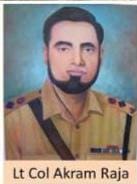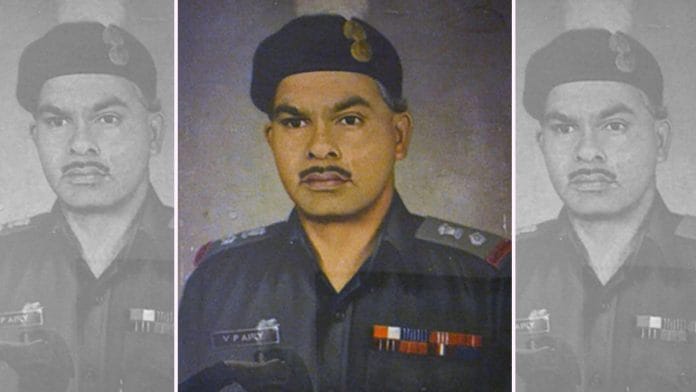New Delhi: When the body of a Pakistani officer was found in the village of Jarpal near the western border a day after the 1971 war ended, rigor mortis had frozen his arms outstretched, in the same position that he had held his sten gun. It was evident he had been rearing to charge ahead right until the moment he died.
It was a moment that struck the Indian Army commanding officer whose battalion had fought and defeated the Pakistani soldier — identified as commanding officer Lt Colonel Mohd Akram Raja — and his unit in a battle lasting several days. It was a moment the Indian officer, the then Lt Colonel Ved Prakash Airy, decided won’t go unrecognised.
So, when Raja’s body was returned to Pakistan on 18 December 1971, Airy sent a note inside his casket. Titled ‘Tribute to a Soldier’, the note described how Raja had died a “real soldier’s death”. “Our hats off to him,” Airy wrote.
The note struck a chord back in the soldier’s country. In the subsequent days, Raja was honoured with the Hilal-i-Jur’at, Pakistan’s second highest military honour.
Over three decades later, Airy’s gesture came back to him in an unexpected gift from the slain officer’s son.
The story of Raja and Airy, who went on to become a Lt General, is the kind that emerges from the destruction of war to enter military lore as a testament to soldiers’ honour. In the year that marks the golden jubilee of the 1971 Bangladesh Liberation war, ThePrint brings you this account of two officers from rival countries who never met each other but became a part of each other’s story.
Also Read: 5 heroes of 1971 Bangladesh Liberation War who led India to decisive win over Pakistan
The note
During the 1971 war, then Lt Col Ved Prakash Airy was charged with commanding a battalion of the Grenadiers in the battles of Bhairo Nath and Basantar River in the Shakargarh Sector on the border with Pakistan.
Airy, who won a Maha Vir Chakra for his role in the battles, and his battalion captured enemy positions after a fierce fight and held on to them despite massive counter-attacks.
One such counter-attack, in village Jarpal, was led by Mohd Akram Raja, who was commanding 35 Frontier Force Regiment (FFR) of Pakistan Army, according to the note written by Airy.

“He was personally leading the attack by being in the front line of assault when he was hit by an MMG (medium machine gun) burst from our position right on the face, killing him on the spot,” his note said.
His body, the note said, was recovered on 17 December 1971, after it was brought to the notice of Indian soldiers by a prisoner of war (PoW) who also helped them identify the officer.
“We found both his arms frozen after death in the position in which he was holding his sten gun, which indicates his determination to get ahead,” he wrote.
“In this action, Lt. Col Mohd Akram Raja displayed courage, determination and personal bravery of the highest order in keeping with the traditions of the soldiers. This heroic deed of Lt Col. Raja, a brave soldier, should not go unnoticed,” he wrote.
Speaking to ThePrint, Airy’s daughter Ritu A. Pandit said the note was sent back with Raja’s body. The body, she added, was returned with full military honours — his body was placed in a casket and his ranks were packed into a small silver box.
Decades later, she said, Lt Gen. Airy received a surprise when his unit went on a United Nations Peacekeeping mission in Lebanon in 2006. During a function to mark ‘Jarpal Day’, to commemorate the 1971 battle, portraits of both commanding officers were exchanged, added Pandit. The portraits, she said, are displayed at two Officers Mess premises in both countries.
But what truly touched her father, Pandit added, was a personal memento sent to him by Raja’s son. “It was his most treasured gift before he died,” she said.
A soldier’s exploits
Lt Gen. Airy was a soldier who courted much respect for his exploits.
“With utter disregard for his personal safety, under heavy enemy shelling and small arms fire, he went from trench to trench motivating his men. Due to his personal example and bold leadership his battalion remained steadfast and resolute,” reads his Maha Vir Chakra citation.
Pandit said her father had been popular among his men for a stick he carried — called “doga” — and a white balaclava he always wore.
Recalling another incident from the 1971 war, she said her father had helped fulfil Pakistani PoWs’ desire to watch Pakeezah after the declaration of the ceasefire and surrender by the Pakistan Army.
“My father managed to arrange the screening of the film with a makeshift projector and the soldiers managed to watch it,” Pandit said.
There was also a time during the war, she added, when her father had a close shave with death.
“Bullets had scraped his leg, his jacket had a big gaping hole. But my father told his men to be sure that none of them turns back to leave during the war,” she said.
Airy, she added, would tell her how depressing it would be to see his own men dying, “the dark and the smoke making it difficult to locate each other and yet they would be carrying on”.
It was his unit, she said, that helped Airy recover from the debilitating impact of a stroke he suffered in 2006. The stroke caused Airy to lose his memory partially.
“But when some of his men came to meet him, he was able to remember all the incidents of the war that were narrated to him, even though he couldn’t recall an incident that would have happened two months ago,” she added.
His team, she said, played a critical role in bringing him out of the “semi-conscious state that the stroke left him with”.
“His unit was dear to him. For him, it was like a family reunion whenever they met him,” she added.
Airy died in 2007. Both his sons are Major Generals in the Army. One of them retired earlier this year.
Edited by Sunanda Ranjan
Also Read: ‘Didn’t know I’d live to get this’ — 1971 PoW, Vir Chakra awardee receives Vijay Mashaal torch







General Ved Prakash Airy, Maha Vir Chakra was a gem of man! He came across has a hard task master which he was bug at heart hd was a caring an extremely caring and considerate person. I have some very fond memories of him and Mrs Airy. They were a lovely couple!!! I wish there were more like in the Fauj …….
A true soldier, hats off and very proud of him as an Indian citizen.